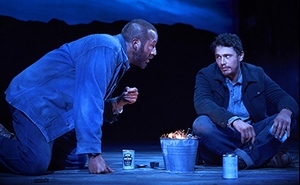“Of Mice and Men” opened April 16, 2014 at the Longacre Theatre.

Chris O'Dowd and James Franco (Photo by Richard Phibbs)
It’s nighttime and George and Lennie have stopped to rest on
a sandy bank of the Salina
River. They are heading
for a job for migrant agricultural workers. The scene shifts to a bunk house where
the migrants sleep and mingle. It is
here that George hopes to earn enough money to secure his dream of buying his
own farm and where he and his mentally-challenged side-kick Lennie’s dream can
be summed up with the immortal line, “We’ll live off the fat of the land.”
John Steinbeck’s “Of Mice and Men” is not meant to represent
a timeless microcosm of life among American migrant workers during the 1930s,
as does his later novel “The Grapes of Wrath.” It does, however, create its own
small world with a highly stylized vision of truth. In some ways, it is as far
removed from reality as the screwball film comedies from the same era. This
doesn’t mean that this tale of two drifters adrift between reality and fantasy
has become a fossilized relic.
Director Anna D. Shapiro has staged an unhurried but sturdily
humanized production that is buoyed by the presence of two actors of note James
Franco as George and Chris O’Dowd as Lennie. Although I take exception to some
of her directorial decisions, particularly the way that the final scene is
staged, she succeeds in highlighting the central meaningful relationship within
the play. Certainly the fraternal love between George and Lennie is even more
to the point in 2014. This is the dimension of the plot that remains universal
rather than the predictably tragic plot or the one dimensional supporting
characters.
It is also fortunate that Franco and O’Dowd have sought to
go one step beyond the more obvious and stereotypical models for their
characters. Because of this, the core of the play – the strange but symbiotic
relationship of two unwitting victims of the times – is able to support the
weaker circumference, the vision of a social system empowered by greed and
materialism.
Steinbeck’s play version of his novel is tied to the novel’s
structure as dramatic literature, with each chapter a different scene. A few
months after publication, Steinbeck began work on the stage adaptation with
playwright George S. Kaufman, who would also direct the original production.
This opened on Broadway less than a year after the novel’s publication on November 23, 1937 with
Broderick Crawford, as Lennie and Wallace Ford, as George. Taking its title
inspiration from Robert Burns’s poem “To a Mouse” (that “the best-laid schemes
of mice and men” often go awry), the play takes place over a three-day period
on a ranch in an agricultural valley in
Northern California during the Depression.
Whether Lennie may have actually been kicked in the head by
a horse as a child (used by George as an excuse for Lennie), or was just born
that way, O’Dowd’s performance as the tall, husky oaf with an obsession for
petting small furry animals and soft sensual fabrics is deeply moving. Best
known for starring in the film “Bridesmaids,” O’Dowd holds our attention by the
sheer poignancy of his portrayal. Whether becoming agitated by the goading of
the black stable hand or becoming sexually aroused by the insinuating moves of
Curley’s wife, he makes it easy for us to respond empathetically to the
simplicity of Lennie’s basic needs.
As keeper of the flame and Lennie’s fraternal protector, the
multi-talented Franco (actor, director, screenwriter, producer teacher and
author) commendably conveys the inner tenderness and outward strength that
gives this pivotal character its principal resonance. The scenes, in which
Lennie and George talk and dream of owning a farm together, are touching indeed
and easily validate their friendship and the support they bring to each other. I
liked the more emotionally disconnected migrant workers around them exist as
distinct and illuminating worlds unto themselves.
The play reaches its most dramatic detour when a series of
tragic accidents occur involving the combustible, bad-tempered Curley (Alex
Morf), the farm’s bullying foreman and Curley’s manipulative, skittish wife (Leighton
Meester). Jim Parrack fuels his role as Slim, the mule team foreman, with an
appealing mix of compassion and virility. Notwithstanding the dying old dog and
companion he drags along with him, Jim Norton targets our hearts, as the
physically handicapped Candy, who regales us with a memory of his visit to a
swank cat house twenty years ago. Jim Ortlieb, as The Boss, Joel Marsh Garland,
as the feisty Carlson, James McMenamin, as the youthful Whit, and Ron Cephas Jones,
as the embittered Crooks, contribute mightily to the reality.
Written one year before his masterpiece “The Grapes of
Wrath,” but acknowledged as a stunning testament to the migrant workers who
work with the dream of a better life “Of Mice and Men” is all about what
Steinbeck saw first hand as a young man. What he brought to light remains true
to this day only more global in its reach in light of the rampant and greedy
exploitation by US companies of native workers in foreign countries.
"Of Mice and
Men" (through July 27,2014)
For tickets ($42.00 - $135.00) call 212 - 239 - 6200
No comments:
Post a Comment